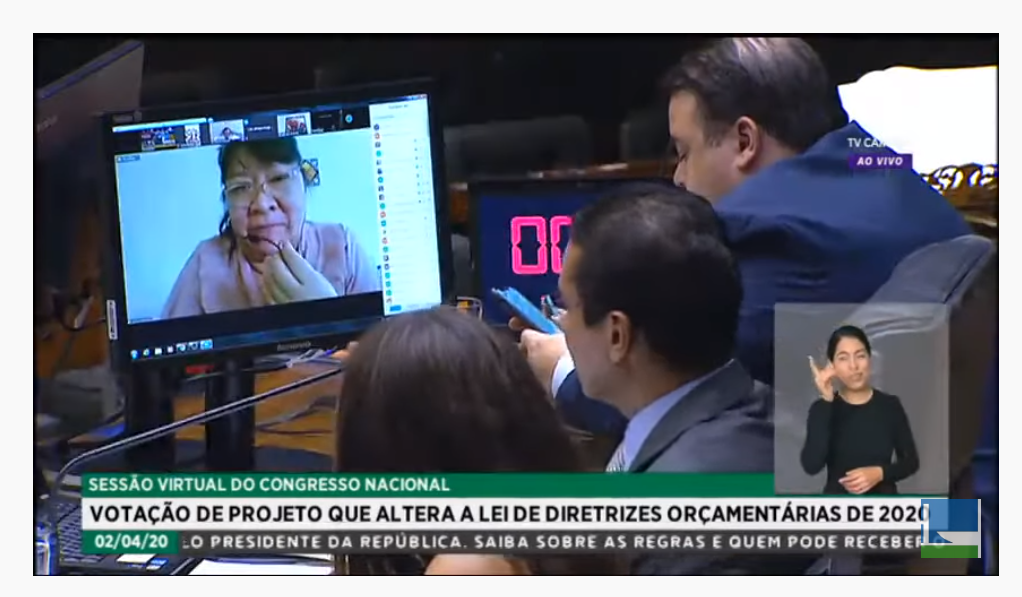
Since the beginning of the coronavirus outbreak, legislative bodies around the world have struggled to function. Meanwhile, from Europe, all the way to Australia and Pakistan, calls to ensure that national legislatures continue to operate abound. In the UK, over 100 MPs signed an open letter asking for the creation of a digital parliament to “maintain democratic traditions in accordance with social distancing.” In the US, amidst media concerns of a “sidelined” Congress, dozens of House Democrats sent a letter to their leadership calling for a change in the rules to enable remote voting.
The disruption in legislative work caused by the pandemic has visibly impacted crisis response efforts. For instance, in Canada, the House of Commons delayed for weeks the vote on a critical wage bill, aimed at covering a percentage of employees’ wages so that employers can keep them on the payroll. The key point of contention? Liberals wanted to vote via virtual parliament, while Conservatives asked for in-person participation.
The functioning of parliaments becomes all the more important as fears of executive overreach are revealed to be founded). Indeed, previous evidence suggests that a pandemic crisis is fertile ground for authoritarian drifts; and chronic abuses are unlikely to stop as the outbreak expands and a growing number of parliaments are unable to work.
Freedom of information for example – particularly relevant during such crises – is under assault. The Global Right to Information Rating shows that since the beginning of the coronavirus outbreak, countries on multiple continents have altered or lifted their “right to know” legislation. At the same time, a growing number of governments restrict journalistic coverage of the outbreak through threats and detentions.
In a context where traditional forms of collective action and resistance – such as social movements and protests – are constrained by physical distancing, parliaments should be the first line of defense in flattening the authoritarian curve. While innovative models of social activism are certainly emerging, they may not be sufficient to contain authoritarian drifts. To avoid rule of law giving way to rule by decree, parliaments must continue working, even if virtually.
The Brazilian Virtual House of Representatives

On March 11th, the Director General of the World Health Organization (WHO) declared the coronavirus outbreak a pandemic. Six days later, in one of the swiftest parliamentary responses, the Brazilian House of Representatives approved a normative resolution authorizing MPs to vote online and provided guidelines for the launch of a “virtual parliament”.

The Office of the Clerk and the House’s digital services (Department for Information Technology and Innovation, DITEC) immediately got to work on the technical solutions required by this rule change. The mobile application Infoleg, originally developed to follow up on the work of the House of Representatives, was repurposed to enable MPs’ mobile phones, following authentication protocols, to function as remote devices for registering presence and casting votes. But Infoleg is more than an e-voting app: it integrates most of the information required by an MP to properly navigate parliamentary sessions, including the list of representatives that will discuss a bill, or the pending procedural motions involved in the deliberation of a matter. While MPs use an external videoconferencing system for their interventions during sittings, the critical systems for registering presence and votes are entirely developed and managed by the House’s internal digital services.
On March 25th, eight days after enacting the new Rules of Procedure, the House of Representatives conducted the first online voting in its history. By April 9th ten virtual sessions had been held, with 15 pieces of legislation, six urgency motions and one constitutional amendment passed. Average attendance for these ten virtual sessions was 98.6% (503 out of 513 representatives), far above the in-person average (87.1%). The constitutional amendment, it seems, was the first ever to be approved by a legislative body through online voting. It was also one of the fastest legislative responses to the financial challenges generated by the pandemic – especially important given the delicate fiscal situation of the country.
Explaining the rapid transition
There is no single explanation of why some parliaments are struggling to function, while others are being more reactive. Yet in the case of Brazil, three enabling factors are worth highlighting.
Political response
Strong digital capacity does not guarantee a smooth transition to a virtual modus operandi. Take for instance Estonia, which has one of the most technologically savvy governments in the world and where online voting for elections is old news: as noted by Andy Williamson, Senior Researcher for the Inter Parliamentary Union, existing regulation prohibits remote sitting of the Estonian parliament. In other words, along with digital capacity, the shift to a virtual parliament may in many cases require political leadership to eliminate analog obstacles. In the Brazilian case, this included swift action by the Speaker of the House, who expedited a normative resolution that was rapidly approved by MPs across the political spectrum. This process, however, must be understood in its broader political context. The current relationship between the national Executive and Legislative is notoriously conflictual. It is therefore possible that the rapid response was also a preemptive move by the House to avoid executive overreach and to maintain political relevance during the crisis. Parliaments in similar situations may want to take note.
Administrative capacity
The importance of the administrative capacity of the Office of the Clerk (the Office) should not be understated. Amassing some of the most qualified civil servants in Brazil, it is the Office that makes political responses technically viable – examining constraints and opportunities and advising the House leadership on the most effective approaches. It should be noted that the adoption of the virtual parliament resolution was facilitated by existing legislation. Passed in October 2019 as a result of a shared vision between the House leadership and the Office of the Clerk, this legislation includes guidelines for a paperless legislative process.
Digital capacity
Finally, a key enabler of the rapid response by the Brazilian House was the existence of a highly qualified, in-house digital team (DITEC), with the mandate and resources to quickly redesign systems that were already developed , maintained and updated internally (e.g. Infoleg, remote voting for committees). The full implementation of the virtual parliament was by no means a small task, and involved DITEC’s core teams on user experience, cybersecurity, application development, legislative informatics, voting and attendance systems, plenary operation (e.g. video streaming), help desk, and emergency response.
It is worth noting that DITEC’s response builds on a tradition of excellence. The House of Representatives has for over a decade been a trailblazer in digital democracy, illustrated for instance by the 2009 launch of e-Democracia, a collaborative platform to engage citizens and civil society organisations in the lawmaking process.
In short, digital transformation does not happen overnight, and the House’s timely response to pandemic-related challenges was in part due to in-house capacity built and honed over the years. (Full disclosure, I was an adviser to the e-Democracia program in its early days, when working on my research on digital parliaments).

Potential effects of virtual parliaments
It is too early to assess the effects of the pandemic on democratic institutions. The same is true for the medium- and long-term effects of legislatures’ transitions to digital environments. But for the Brazilian case, we can hypothesize:
Effects on party politics
The virtualization of parliamentary procedures may lead to further strengthening of party leaders. First, given that MPs are no longer traveling to the capital, the number of in-person meetings, both formal and informal, is drastically reduced. This reinforces the coordination role of party leaders, already an important position in Brazil. Second, with sittings taking place virtually, for practical reasons the ‘floor time’ allocated to MPs is reduced, increasing the visibility of party leaders who also control the floor time allowed for their MPs.
The impact of this increased influence and visibility of party leaders is uncertain. On the one hand, in a multi-party system with 24 parties represented in the House, a strengthening of leaders’ coordination roles may facilitate the management of legislative politics and even enhance House efficiency. On the other hand, it may weaken the position of a considerable contingent of representatives who work somewhat independently, across party lines. This could be particularly problematic for newly elected MPs who benefited from the support of political renewal movements, whose allegiances to party lines are weaker. This effect could be offset, however, by the stronger online presence of these new, often younger MPs who are used to engaging remotely with their constituents.
Effects on media coverage and third party oversight
As in most countries, the media coverage of politics in Brazil is centered in the capital city, with most journalists, offices and support staff based in Brasília. A good part of that infrastructure depends on in-person and informal exchanges between journalists and their sources, through hallway conversations, over coffee, or at social events. Civil society organisations follow a similar pattern, focusing their advocacy and oversight activities where most MPs are found. With a transition to virtual operation, economies of scale in terms of geographic location and in-person interactions are lost.
A potential secondary effect is that the House becomes less subject to scrutiny from the press and organized groups. Some CSO leaders have indeed expressed such concerns over the shift. José Antonio Moroni, leader of a coalition of social movements for political reform lamented to a local media outlet: “[…] before the MPs circulated in the corridors, and we managed, to a certain extent, to have a dialogue. Now, with this process, we get nothing.” But organisations are reacting quickly, as described by a member of the Education Workers’ Confederation: “We, for instance, already have a list of all the MPs, with e-mail, WhatsApp details, and now we are incentivizing our member organizations not only to maintain their communication with MPs, but actually to intensify the online pressure.”
More digital politics (and fake news)
As the Brazilian parliament moves to an online environment and physical distancing measures continue to be implemented (with varying degrees of success), we should also expect that more political conversations will take place online. This is not necessarily good news, particularly given that some studies suggest that Brazil is particularly fertile ground for fake news. Add to this a combination of a growing polarization between the branches of government, and the infodemic generated by the current crisis, and you have all the ingredients for accelerating the fake news arms race in the country. As we argued in a recent report, a possible consequence of this arms race is a further and unhealthy shift of the focus of public debates: towards disputes over the authenticity of statements and evidence, reducing the time and energy left to discuss possible actions and solutions to problems.
Whether these hypotheses are validated or not remains an empirical question. These effects become more probable the longer that parliament is obliged to work remotely – a function of the length of the crisis.
So what?
For national legislatures like Brazil’s, the hypothetical adverse effects of a virtual parliament are dwarfed by the possibility of undermining the structure of checks and balances. In other words, these potential effects should be weighed against the possibility of a closed parliament.
The temporary transition to an online environment should also be regarded as an opportunity to explore options for a more open parliament going forward. For example, virtual citizen panels, consisting of randomly selected citizens representing a microcosm of the population, could be convened online to advise on divisive issues including crisis response measures (after all, if parliament can function in a decentralized manner, why not consider the same for a more participatory model of politics?) Such an effort – which would, again, require a political decision by the House leadership – would put the parliament at the forefront of democratic innovations.
In this respect, from a digital democracy perspective, the Brazilian case is one more example of the prospects and limitations of technology for achieving democratic aspirations. The fact that the House adopted a virtual model is critical at this moment. Yet it does not render the legislative any more transparent, representative or participatory than before. Without reforms, digital practices will always mirror their analog origins, whether good and bad. International organizations, donors and tech enthusiasts should not therefore delude themselves: establishing virtual parliaments will do nothing for national legislatures that suffer from pre-existing conditions or that are already on life support. As some recent events attest, national parliaments themselves can be accomplices in the crossing of democratic lines during the coronavirus response.
From a more technical perspective, democracy scholars and practitioners (myself included), have long been aware of the importance of face-to-face interactions for democratic processes. The limitations of existing solutions for digital replication of these interactions was no secret. What few of us expected, however, was how fast democratic praxis would have to transition to a virtual space in order to maintain basic functioning. This applies not only to legislative procedures but also to democratic innovations such as participatory budgeting and citizens assemblies. Unless one believes this pandemic is a one-off with short-term consequences only, the current context reveals the need to invest time and resources in reducing, at least partially, the dependency of democratic processes on face-to-face interaction. If the question of how to best achieve online participation and deliberation at scale was once a niche area, this is no longer the case.
On a more futuristic note: could virtual parliaments be an additional source of resilience in the case of unilateral action by any given executive? Consider the case of Estonia’s Digital Embassies program. Based on cloud technology and off-site servers based in Luxembourg, the program aims to ensure the functioning of critical government functions regardless of Estonia’s territorial integrity. Historically, parliaments have been shut down through coercion of parliamentarians and the closure of legislatives’ physical spaces. But what happens if a parliament can work virtually, with MPs geographically dispersed within and outside their territory? Again, it is an empirical question that – one hopes – won’t need to be answered anytime soon.
Finally, and back to the Brazilian case: as previously mentioned, several countries have altered or lifted their “right to know” legislation during the crisis. The Brazilian President recently enacted a provisional measure temporarily suspending deadlines for answering certain information requests from the public. The Speaker of the House has already announced his intention to reverse the measure in parliament. While the final result is hard to anticipate, one thing is certain: the next battle for the right to information in Brazil will take place online.
****
Further reading:
GovLab – CrowdLaw Communiqué: Continuity of Legislatures
OECD – How can digital tools support deliberation?
Hansard Society – How are parliaments responding to the coronavirus pandemic?
The Inter-Parliamentary Union – Parliaments in a time of pandemic


